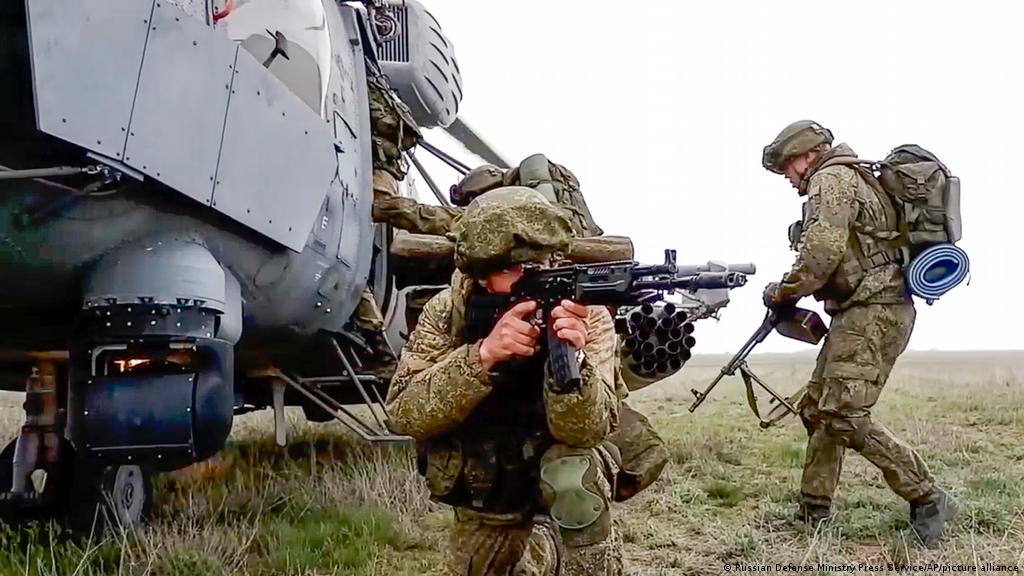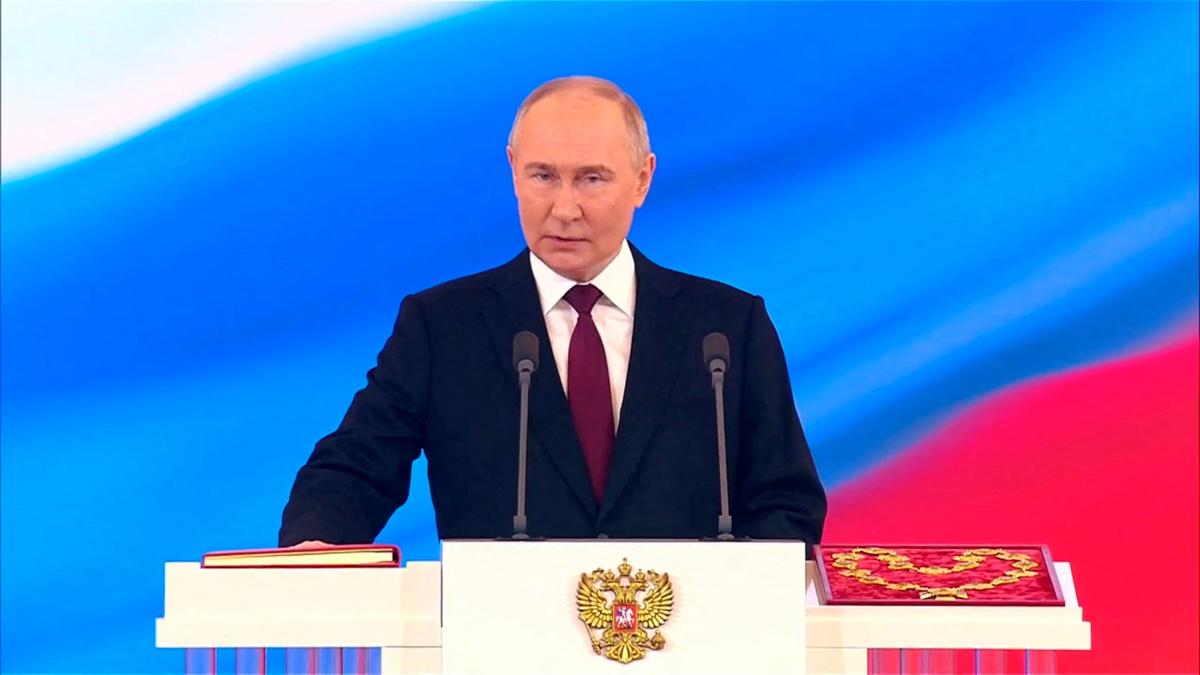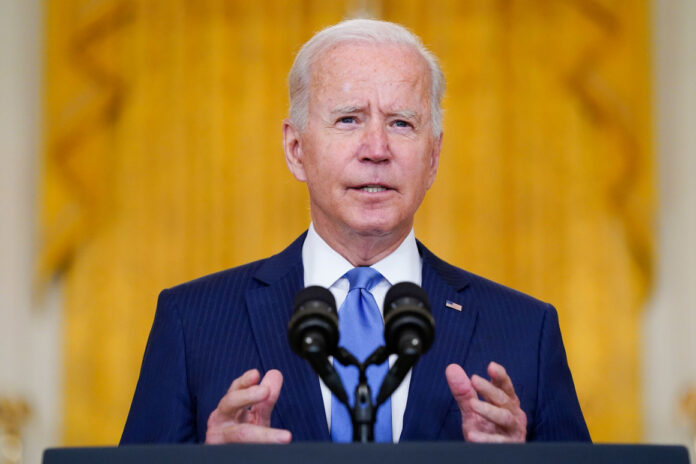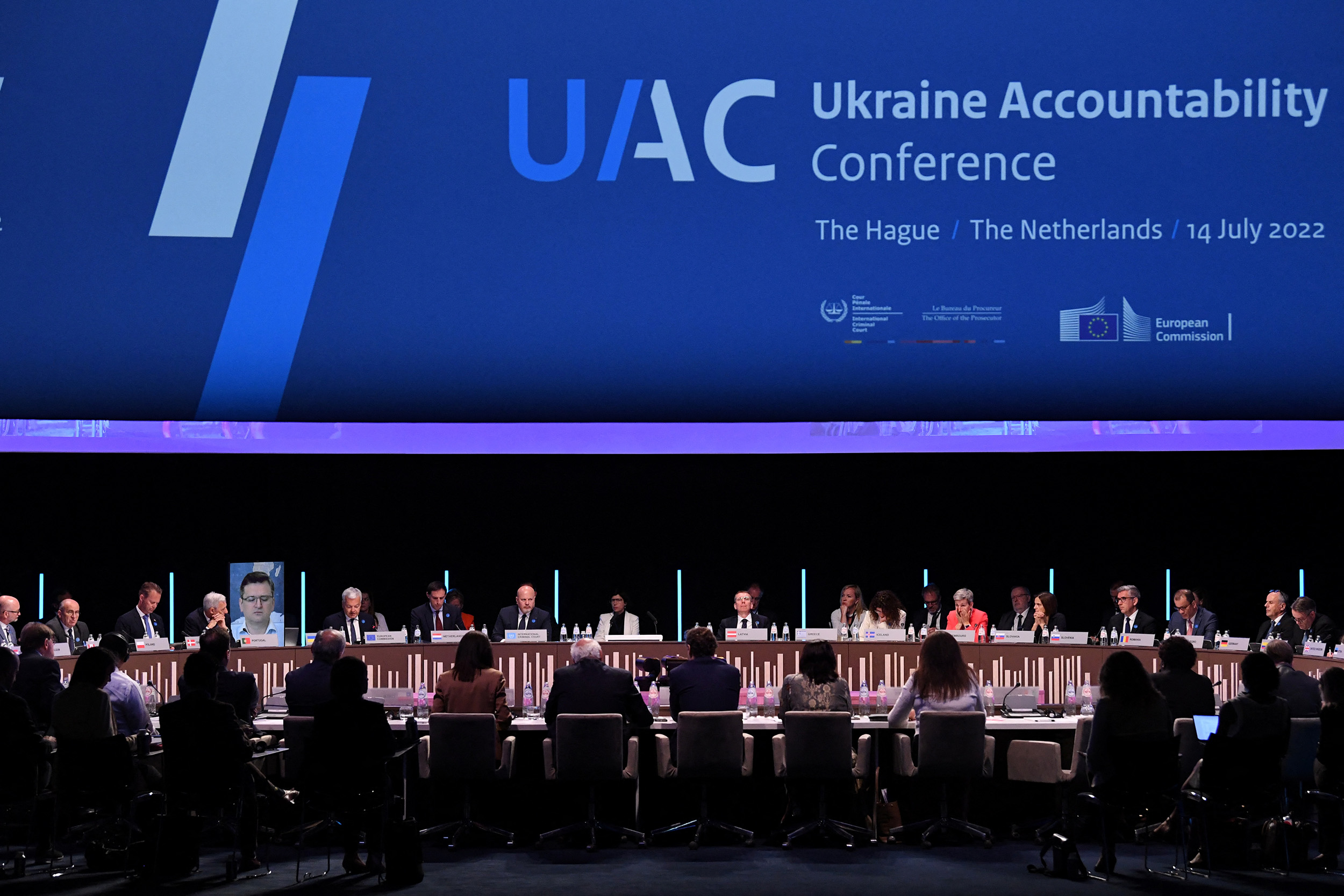Headlines
Tensions in Ukraine: The West Is Skeptical of Russian Overtures

By Derrick Bangura
Russia made two overtures to counter tensions in the region, reporting a troop pullback near Ukraine and welcoming talks with the West. The US and its allies, on the other hand, said they needed proof of the troop movements and that the threat of a Russian invasion remained.
Conflict
After weeks of rising East-West tensions, Moscow massed over 150,000 troops on three edges of Ukraine and staged large military drills for the second day Tuesday, there were glimpses of hope that Europe would avert conflict. As a result of these actions, Washington, London, and other European capitals have issued dire warnings that Russia is ready to invade Ukraine.
This week, however, the tone has shifted. President Vladimir Putin stated on Tuesday that Russia does not desire conflict and will rely on negotiations to eliminate any possibility of Ukraine joining NATO in the future, which is his main objective in the situation. At the same time, he refused to commit to a complete retreat, stating that Russia’s next steps in the standoff would be determined by how the situation unfolded.
Russia also provided scant details about the retreat, and President Joe Biden stated that American authorities had not independently corroborated Russia’s claim. He promised that the United States would give diplomacy “every chance,” but he expressed reservations about Moscow’s intentions.
“There are still two paths available,” Biden remarked at the White House. “But make no mistake: If Russia violates international law by invading Ukraine, responsible nations all across the world will not hesitate to retaliate.” We will undoubtedly pay a higher price tomorrow if we do not stand up for freedom when it is threatened today.”
Throughout the crisis, Ukrainian leaders have tried to convey both calm and power. President Volodymyr Zelenskyy declared Wednesday a “day of national unity,” encouraging citizens to display the blue-and-yellow flag and sing the national song in the face of “hybrid dangers.”
Despite the rays of hope, Biden said 150,000 Russian troops are now stationed in Ukraine and in Belarus, up from a previous US estimate of 130,000 troops.
Russia’s claim that it pulled back troops “would be good, but we have not yet verified that,” Biden said. “Indeed, our analysts indicate that they remain very much in a threatening position.”
Russia has denied having any invasion plans. It wants the West to keep Ukraine and other former Soviet nations out of NATO, halt weapons deployments near Russian borders and roll back forces from Eastern Europe.
The U.S. and its allies have roundly rejected those demands, but they offered to engage in talks with Russia on ways to bolster security in Europe.
Speaking after meeting with German Chancellor Olaf Scholz, Putin said the West agreed to discuss a ban on missile deployment to Europe, restrictions on military drills, and other confidence-building measures — issues that Moscow put on the table years ago.
He said Russia is open to discussing “some of those elements,” but added that it would do so only in combination “with the main issues that are of primary importance for us.”
While Scholz reiterated that NATO’s eastward expansion “is not on the agenda — everyone knows that very well,” Putin retorted that Moscow will not be assuaged by such assurances.
“They are telling us it won’t happen tomorrow,” Putin said. “Well, when will it happen? The day after tomorrow? What does it change for us in the historic perspective? Nothing.”
Scholz also said diplomatic options are “far from exhausted,” and he praised the announcement of a troop withdrawal as a “good signal,” adding: “We hope that more will follow.”
The Russian Defense Ministry released images of tanks and howitzers rolling onto railway platforms and more tanks rolling across snowy fields. It did not disclose where or when the images were taken, or where the vehicles were headed, other than “to places of permanent deployment.”
Ukraine expressed skepticism
“We won’t believe when we hear, we’ll believe when we see,” Ukrainian Foreign Minister Dmytro Kuleba said.
And NATO Secretary-General Jens Stoltenberg said that there have been no signs, so far, of a reduced military presence on Ukraine’s borders.
Meanwhile, a series of cyberattacks knocked out the websites of the Ukrainian army, the defense ministry, and major banks. There was no indication that the relatively low-level denial-of-service attacks might be a smokescreen for more serious cyber mischief. White House press secretary Jen Psaki said the U.S. has not yet determined who was behind the attacks.
Despite the worst East-West tensions in decades, few Russians expect a war. In a village in Russia’s Belgorod region, about 30 kilometers (18 miles) from Ukraine’s border, residents carried on with life as usual, even as more military personnel have been passing through village streets.
“We are really on the border, we really have relatives here and there, everyone has somebody” on the Ukrainian side, villager Lyudmila Nechvolod said. “No one wants war.”
Russian legislators have pushed Putin to recognize the separatist-held territories of eastern Ukraine as separate republics. The State Duma, Russia’s lower chamber, voted to make such a request to Putin.
Putin said the request indicates Russian public compassion for those stuck in the fighting in eastern Ukraine, which has claimed the lives of nearly 14,000 people since 2014. He did say, though, that Russia still believes the 2015 peace pact signed by France and Germany should be the primary vehicle for resolving the separatist dispute.
Headlines
Noble Ladies Champion Women’s Financial Independence at Grand Inauguration in Abuja

Women from diverse backgrounds across Nigeria and beyond gathered at the Art and Culture Auditorium, Abuja, for the inauguration and convention of the Noble Ladies Association. The event, led by the association’s Founder and “visionary and polished Queen Mother,” Mrs. Margaret Chigozie Mkpuma, was a colourful display of feminine elegance, empowerment, and ambition.
The highly anticipated gathering, attended by over 700 members and counting, reflected the association’s mission to help women realise their potential while shifting mindsets away from dependency and over-glamorization of the ‘white collar job.’ According to the group, progress can be better achieved through innovation and creativity. “When a woman is able to earn and blossom on her own she has no reason to look at herself as a second fiddle,” the association stated.
One of the association’s standout initiatives is its women-only investment platform, which currently offers a minimum entry of ₦100,000 with a return of ₦130,000 over 30 days—an interest rate of 30 percent. Some members invest as much as ₦1 million, enjoying the same return rate. Mrs. Mkpuma explained that the scheme focuses on women because “women bear the greater brunt of poverty” and the platform seeks “to offer equity in the absence of economic equality.”
Education is also central to the Noble Ladies’ mission, regardless of age. Their mantra, “start again from where you stopped,” encourages women to return to school or upgrade their skills at any stage in life. The association believes that financial stability is vital in protecting women from cultural practices that dispossess widows of their late husbands’ assets, while also enabling them to raise morally and socially grounded families.
Founded on the vision of enhancing women’s skills and achieving financial stability, the association rests on a value system that discourages pity and promotes purpose. “You have a purpose and you build on that purpose to achieve great potentials and emancipation,” Mrs. Mkpuma said.
A criminologist by training and entrepreneur by practice, she cautions against idleness while waiting for formal employment. “There are billions in the informal and non-formal sectors waiting to be made,” she said, rejecting the “new normal of begging” and urging people to “be more introspective to find their purpose in life and hold on to it.”
Mrs. Mkpuma’s management style keeps members actively engaged, focusing on vocational skills and training to prepare them for competitive markets. She is exploring “innovative integration of uncommon technologies” and is already in talks with international franchises to invest in Nigeria, with Noble Ladies as first beneficiaries.
The association’s core values include mutual respect, innovation, forward-thinking, equal opportunity, and financial emancipation. With plans underway to establish a secretariat in the heart of Abuja, the group aims to expand its impact.
The event drew high-profile guests, including former Inspector General of Police, Mike Okiro, and a host of VIPs, marking a significant milestone in the association’s drive for women’s empowerment.
Headlines
NEPZA, FCT agree to create world-class FTZ environment

The Nigeria Export Processing Zones Authority (NEPZA) has stepped in to resolve the dispute between the Federal Capital Territory Administration and the Abuja Technology Village (ATV), a licensed Free Trade Zone, over the potential revocation of the zone’s land title.
Dr. Olufemi Ogunyemi, the Managing Director of NEPZA, urged ATV operators and investors to withdraw the lawsuit filed against the FCT administration immediately to facilitate a roundtable negotiation.
Dr. Ogunyemi delivered the charge during a courtesy visit to the Minister of the Federal Capital Territory, Barrister Nyesom Wike, on Thursday in Abuja.
You will recall that the ATV operators responded to the revocation notice issued by the FCT administration with a lawsuit.
Dr. Ogunyemi stated that the continued support for the growth of the Free Trade Zones Scheme would benefit the nation’s economy and the FCT’s development, emphasizing that the FCT administration recognized the scheme’s potential to accelerate industrialisation.
Dr. Ogunyemi, also the Chief Executive Officer of NEPZA, expressed his delight at the steps taken by the FCT minister to expand the economic frontier of the FCT through the proposed Abuja City Walk (ACW) project.
Dr. Ogunyemi further explained that the Authority was preparing to assess all the 63 licensed Free Trade Zones across the country with the view to vetting their functionality and contributions to the nation’s Foreign Direct Investment and export drives.
“I have come to discuss with His Excellency, the Minister of the Federal Capital Territory on the importance of supporting the ATV to succeed while also promoting the development of the Abuja City Walk project. We must work together to achieve this for the good of our nation,” he said.
On his part, the FCT Minister reiterated his unflinching determination to work towards President Bola Ahmed Tinubu’s Renewed Hope Agenda by bringing FDI to the FCT.
“We must fulfil Mr. President’s promises regarding industrialization, trade, and investment. In this context, the FCT will collaborate with NEPZA to review the future of ATV, a zone that was sponsored and supported by the FCT administration,” Wike said.
Barrister Wike also said that efforts were underway to fast-track the industrialisation process of the territory with the construction of the Abuja City Walk.
The minister further said the Abuja City Walk project was planned to cover over 200 hectares in the Abuja Technology Village corridor along Airport Road.
According to him, the business ecosystem aimed to create a lively, mixed-use urban center with residential, commercial, retail, hospitality, medical, and institutional facilities.
He added that the ACW would turn out to be a high-definition and world-class project that would give this administration’s Renewed Hope Agenda true meaning in the North-Central Region of the country.
Barrister Wike also indicated his continued pursuit of land and property owners who failed to fulfil their obligations to the FCT in his determination to develop the territory.
Headlines
Benue IDPs block highway, demand return to ancestral homes

Vehicular movement along the Yelwata axis of the Benue–Nasarawa highway was brought to a standstill on Wednesday as Internally Displaced Persons, IDPs, staged a protest, demanding immediate return to their ancestral homes.
The protesters, believed to be victims of persistent attacks by suspected herdsmen, blocked both lanes of the busy highway for several hours, chanting “We want to go back home”.
The protest caused disruption, leaving hundreds of motorists and passengers stranded.
Eyewitnesses said the displaced persons, many of whom have spent years in overcrowded IDP camps, are expressing deep frustration over the government’s delay in restoring security to their communities.
“We have suffered enough. We want to return to our homes and farms,” one of the protesters told reporters at the scene.
Security personnel were reportedly deployed to monitor the situation and prevent any escalation, though tensions remained high as of press time.
Efforts to reach the Benue State Emergency Management Agency, SEMA, and other relevant authorities for comment were unsuccessful.
-

 Headlines4 years ago
Headlines4 years agoFacebook, Instagram Temporarily Allow Posts on Ukraine War Calling for Violence Against Invading Russians or Putin’s Death
-

 Headlines4 years ago
Headlines4 years agoNigeria, Other West African Countries Facing Worst Food Crisis in 10 Years, Aid Groups Say
-

 Foreign3 years ago
Foreign3 years agoNew York Consulate installs machines for 10-year passport
-

 News1 year ago
News1 year agoZero Trust Architecture in a Remote World: Securing the New Normal
-

 Entertainment3 years ago
Entertainment3 years agoPhyna emerges winner of Big Brother Naija Season 7
-

 Headlines1 year ago
Headlines1 year agoNigeria Customs modernisation project to check extortion of traders
-

 Entertainment2 years ago
Entertainment2 years agoMovie download platform, Netnaija, announces closure
-

 Economy2 years ago
Economy2 years agoWe generated N30.2 bn revenue in three months – Kano NCS Comptroller















